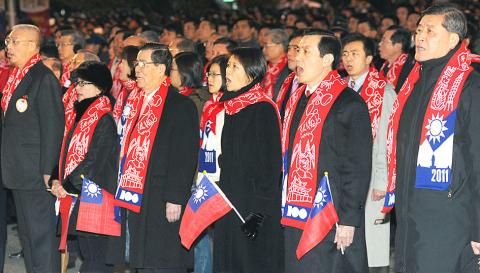|
Taiwanese to decide own future: Ma
GREAT FUTURE:In his New Year’s speech, Ma said
cross-strait peace is the cornerstone of peace and prosperity in the region and
called for more exchanges between the two sides
By Ko Shu-ling / Staff Reporter

President Ma Ying-jeou, second right, Vice
President Vincent Siew, third left, and Premier Wu Den-yih, left, sing the
national anthem at the flag-raising ceremony in the square in front of the
Presidential Office yesterday.
Photo: CNA
President Ma Ying-jeou (馬英九) said in his New Year’s address yesterday that
Taiwan’s future should be decided by its 23 million people and that both sides
of the Taiwan Strait must not fight over political power, but work together for
core values.
“The two sides of the Taiwan Strait should not fight over political power,
unification or independence, or international space,” Ma said. “They should be
motivating each other to upgrade core values such as freedom, democracy, human
rights and the rule of law.”
As the Republic of China (ROC) celebrates the centennial of its founding this
year, Ma vowed to dedicate the next 10 years to building a “golden decade” for
Taiwan and laying a foundation for another 100 years of the ROC.
“The prospects of the country and future of Taiwan are in the hands of its 23
million people,” he said. “We will use our strength to protect the sovereignty
of the ROC, our actions to defend Taiwan’s dignity and our wisdom to build
Taiwan’s future.”
In yesterday’s address, entitled “Building up Taiwan, Invigorating Chinese
Heritage,” Ma said cross-strait peace is the cornerstone of peace and prosperity
in East Asia and the joint responsibility of both sides of the Taiwan Strait.
He urged the two sides to deepen their exchanges, better understand each other,
accumulate more mutual trust and gradually resolve differences. Under the
guidance of “the wisdom of Chinese culture (中華文化智慧),” Ma said he hoped both
sides could build a better future for the “Chinese nation.”
For the next century, Ma said he would like to see the ROC become a navigator of
Chinese culture (中華文化), a model of democracy in the Chinese community (華人世界) and
a global innovation center.
The ROC is an independent sovereignty, Ma said, and he hoped someday all yan
huang zisun (炎黃子孫, or descendants of emperors Yan and Huang) would enjoy a way
of life that is free, democratic and follows the rule of law. He believed that
the dream would soon come true and that China could learn from Taiwan’s
experience of democratization.
Ma’s comment on Taiwan’s future echoed that made by Mainland Affairs Council
(MAC) Minister Lai Shin-yuan (賴幸媛), who recently said the 23 million Taiwanese
have the right to free choice in terms of Taiwan’s future.
During an international forum on cross-strait relations in Taipei early last
month, Lai laid down what she called the seven core interests of Taiwanese. They
are democracy, sovereignty, security, the right to meaningful participation in
international organizations, the right not to be discriminated against, the
right for the disadvantaged to survive and the right to free choice on the
future of cross-strait relations.
Her comment, however, was questioned by Control Yuan member Chou Yang-shan
(周陽山), who said the right to free choice ran counter to a core value of the ROC
Constitution, a precondition of which is “national unification” with China.
Meanwhile, the council yesterday offered a boilerplate answer to Chinese
President Hu Jintao’s (胡錦濤) New Year address in which Hu said China would insist
on -peaceful unification and “one country, two systems” when pushing for the
peaceful development of cross-strait relations.
MAC Deputy Minister Liu Te-shun (劉德勳) said both sides have used
institutionalized negotiation mechanisms to resolve many problems. The Ma
government would continue to negotiate with China and deepen cross-strait
exchanges under the framework of the ROC Constitution and ensure that Taiwan is
always the focus and the people’s interest comes first, Liu added.
|
![]()
![]()
![]()